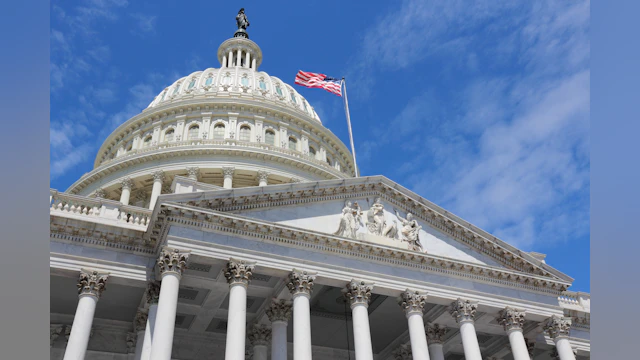International Survivors of Suicide Loss Day, also known as Survivor Day, takes place each year on the Saturday before American Thanksgiving, with virtual and in-person events in communities everywhere. Learn more and find an event near you.
“You have to speak up. Get loud. You have to use your voice. Get on your Representatives. Be heard.” – Representative John Katko
On November 15 2017, the AFSP Public Policy Office held a Congressional staff briefing co-sponsored by the House Task Force on Suicide Prevention in observance of International Survivors of Suicide Loss Day. On this day, people affected by suicide loss gather around the world at events in their local communities to find comfort and gain understanding. Survivor Day had its humble beginnings in 1999, when Senator Harry Reid, himself a loss survivor, introduced a resolution to designate the Saturday before Thanksgiving National Survivors of Suicide Day. Since then, survivors have come together ever year to raise their voices and share stories of healing and hope.
Staff members from 17 Congressional offices were greeted and given a brief explanation of Survivor Day by AFSP’s Vice President of Programs, Dr. Doreen Marshall and Director of Loss and Healing Programs, Brandon English. They each described the personal impact of suicide loss, explaining that the process for healing and grieving is different for every person. Following introductions, Representatives John Katko (R-NY) and Don Beyer (D-VA), the co-chairs of the House Task Force on Suicide Prevention, added their voices. Both men have personal connections in this crisis: Rep. Beyer’s son attempted suicide in 1996, and Rep. Katko lost his niece.
Rep. Beyer brought up the need for a national agenda for suicide prevention, identifying mental health awareness as a key component. He talked about the importance of checking in with others in small ways, engaging in conversation and offering support to remind each other that we are not alone in this. “Small talk saves lives,” he added. Rep. Beyer’s closing remarks called on members of Congress to take action. “Fill these rooms because there are a lot of people on the Hill,” he implored. “It is not about Democrats or Republicans…a small difference starts with you to come up with a national plan.”
Rep. Katko made a silent vow to spend his time in Congress making something out of the loss of his niece. He shared with the room that she was a “good egg” and often visits her grave to bring fresh flowers. What bothers Rep. Katko is the lack of progress we have made in treating mental health. He talked about the immediate allocation of $1.6 billion in funds for combatting the Zika virus. This health crisis had received such a necessary and amazing response, so why not suicide? “Mental health needs to change and the crisis is terrible because we have not paid enough attention to it,” Rep. Katko declared. “You can sit there and feel sad, or you can get pissed off like I am.”
Once introductions were over, AFSP’s Vice President of Public Policy, John Madigan, started the film Life Journeys: Reclaiming Life After Loss. The documentary, third in AFSP’s Journeys series of films about suicide, followed several survivors as they discussed the impact of the loss of their loved ones. A sister placed flowers outside of her late brother’s apartment as she does annually since his passing. A mother showed the last photo she took of her teenage daughter who died by suicide. A husband held the police badge of his late wife while reflecting on the toll her job had taken on her mental health. These survivors shared their stories one by one and held nothing back. They spoke about the whirlwind of emotions they felt from the loss: pain, guilt, anger, and grief.
During this time, Congressional Mental Health Caucus Founder and Chairman Grace Napolitano (D-CA) quietly entered the room. She listened to the survivors describe their efforts to move forward. They each found an outlet, from support groups to spiritual guidance that helped to begin the healing process. They explained that the loss never fades, but support systems eased their struggle and, with time, each of the survivors learned to take it day by day.
There was a respectful silence across the room when the film reached its end. The emotional impact of the survivors’ words was palpable as several Congressional staff members took the moment to wipe away subtle tears. During this time, Doreen, Brandon, and John returned to the podium to answer questions. Rep. Beyer started by asking about established protocols for recovery. Dr. Marshall spoke about a lack of funding in research on the subject. Brandon joined in after her, describing the initial grief as a hand held right up to your face. “Over time the hand moves farther away,” he added, “but it never leaves your line of sight.” A few follow-up questions came afterward about statistics and the relationship between mental health conditions and suicide. “Ninety percent of people who died by suicide had a diagnosable mental health disorder,” John stated in response.
As the briefing came to a close, the AFSP team thanked everyone for taking time out of their busy schedules to attend. Staff members slowly filed out of the room, some stopping to chat further. Each left with fact sheets, complimentary lunches, and pages of notes. The topic had been heavy, but the message of hope and advocacy hung in the air even after the room had emptied.
For more information about AFSP’s documentary Journey film series, click here.
